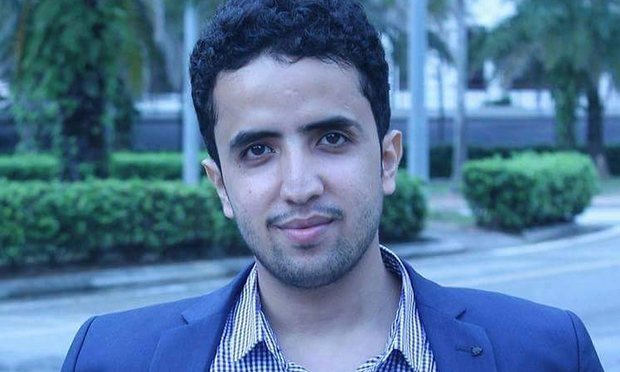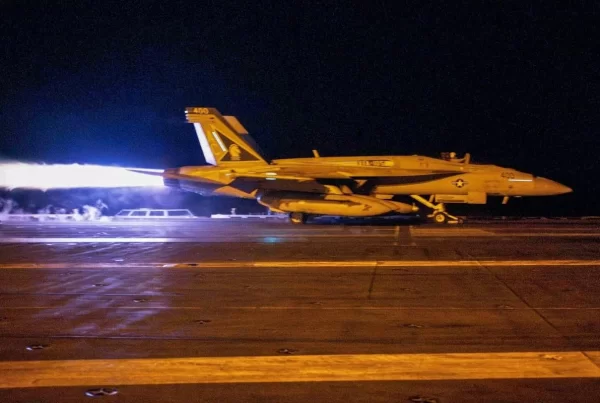At 25, Sadeq Abdullah Saleh al-Guraizea was close to finishing his education and looking forward to the future.
In August, just three months before the end of his master’s degree in IT at Limkokwing University in Malaysia, the English-speaking Yemeni had returned home to the country’s rebel-held capital, Sana’a, to marry. The wedding 10 days later coincided with the resumption of airstrikes by Saudi Arabia, which led to the closure of the airport, forcing him to stay longer than expected.
Last Saturday, still in Sana’a, he accompanied his 56-year-old father, Abdullah, a security officer, to the city’s al-Sala al-Kubra community hall for the funeral ceremony of a well-known sheikh, the father of the Houthi-led government’s interior minister, Galal al-Rawishan. It was to become the site of one of the single most devastating attacks in a conflict that has turned from a civil war to a regional proxy conflagration.
“We went there to offer condolences,” his father told the Guardian. “I sat in the right side of the hall and my son was approximately 5 metres in front of me.” Among the crowd were senior military officials, but also hundreds of civilians.
At about 3.30am, the first Saudi strike hit. “The roof fell and I got injured. I jumped out of a window to get out, thinking that my son had gone out before me,” Abdullah Saleh recalled. “Then I went to look for my son inside; it was impossible to see amid the devastation and fire, it was then that the second missile landed.”
The two munitions dropped by a Saudi warplane, which Human Rights Watch identified as US-manufactured 227kg (500lb) laser-guided bombs, killed 140 people, among them the newly-wed Yemeni and several children. More than 500 people were also injured in what HRW labelled this week “an apparent war crime” by the Saudi-led coalition, which is backed by the US and the UK.
The Saudi military intervention is aimed at reinstating the exiled president, Abd Rabbu Mansour Hadi, and countering the advances of Iran-backed Houthi fighters, who control Sana’a.
One in three Saudi air raids on Yemen have hit civilian sites. “My son was scheduled to go back to Malaysia a week after his marriage,” Saleh said. “My son like many other students had nothing to do with this unjust war. He wanted to return to Malaysia in order to complete his study, and continue a PhD – to achieve his dreams.”

The destroyed hall in Sana’a after Saturday’s airstrike, in which 140 people were killed and more than 500 injured. Photograph: Hani Mohammed/AP
Sadeq Saleh was not a political man, according to his family, and in fact, on his Facebook account, which is still accessible, he comes across as a man who was critical of Syria’s Bashar al-Assad and his main supporter, Iran – also the country Riyadh accuses of militarily backing Houthi rebels.
“It’s catastrophic and bitter, I don’t believe that I have lost my son; it’s an incident unlike any other,” he said. “It is a heinous crime against humanity, and the oddest thing is that this crime was committed by an Islamic country, the so-called Kingdom of Saudi Arabia,” the father said.
Washington used unprecedented language to distance itself from the coalition after the funeral attack. A White House statement said that its security cooperation with Riyadh was not a “blank cheque” and that it was reviewing its “already significantly reduced support to the Saudi-led coalition”.
“After unlawfully attacking schools, markets, hospitals, weddings, and homes over the last 19 months, the Saudi-led coalition has now added a funeral to its ever-increasing list of abuses,” said Sarah Leah Whitson from HRW.
HRW said the Saudi-led coalition with the direct help of the US and assistance from the UK has conducted at least “58 unlawful airstrikes causing civilian loss of life and property”. Houthi fighters, allied with the former president, Ali Abdullah Saleh, have also been accused of serious abuses.
Yemeni analyst Farea Al-Muslimi said that the funeral attack has had a significant effect domestically and is likely to push the conflict further from prospects of peace. He said the conflict risked making Yemen another Syria or Libya. This week, the US for the first time targeted rebel-held territories in retaliation for failed missile attacks on its warship off the coast of Yemen.
“In 2011, Yemen was already facing a humanitarian crisis; in 2014 half of the population were in need of humanitarian aid and now it’s 81%. It’s tragedy after tragedy after tragedy,” he said. “People have lost jobs, people have lost everything – there’s no market except war. If you want to fight, you’ll find the job, if you want to find anything else it’s impossible.”
Ahmad Algohbary, a university student from Dhamar city in south-western Yemen, said he had lost six of his closest friends since the conflict began last year. “People in my city are so broke, there has been no salary for more than two months,” he told the Guardian. “Some people have been evicted from their apartments because they don’t have any money to pay rent. Poor people are everywhere.”
Abdullah Saleh blames the US and the UK as much as Saudi Arabia for the death of his son and the carnage in Yemen. “I wonder about the international silence about these crimes against innocent people,” he said. “Why the international community doesn’t do anything? Aren’t we human beings?
“Saudi Arabia doesn’t distinguish between civic and military targets, and it doesn’t differentiate between child or woman or older man. Saudi Arabia is targeting our country because we don’t have money to buy the international silence.”
This article was published on the Guardian






